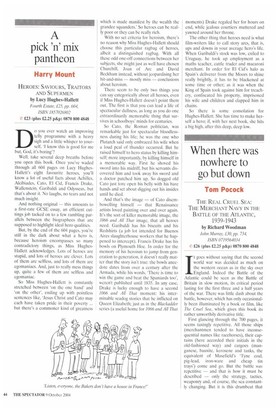pick 'n' mix pantheon
Harry Mount
HEROES: SAVIOURS, TRAITORS AND SUPERMEN by Lucy Hughes-Hallett Fourth Estate, £25, pp. 604, ISBN 1857026802 (I.:, £23 (plus £2.25 p&p) 0870 800 4848 Do you ever watch an improving telly programme with a heavy sigh and a little whisper to yourself, 'I know this is good for me but, God, it's boring"?
Well, take several deep breaths before you open this book. Once you've waded through all 604 pages on Lucy HughesHallett's eight favourite heroes, you'll know a lot of useful facts about Achilles, Alcibiades, Cato, El Cid, Francis Drake, Wallenstein, Garibaldi and Odysseus, but that's about it. No laughs, no tears and not much insight.
And nothing original — this amounts to a first-rate GCSE essay, an efficient cuttings job tacked on to a few rambling parallels between the biographees that are supposed to highlight ideal hero qualities.
But, by the end of the 604 pages, you're still in the dark about what a hero is, because heroism encompasses so many contradictory things, as Miss HughesHallett acknowledges. Lots of heroes are stupid, and lots of heroes are clever. Lots of them are selfless, and lots of them are egomaniacs. And, just to really mess things up, quite a few of them are selfless and egomaniac.
So Miss Hughes-Hallett is constantly stretched between 'on the one hand' and 'on the other', ending up with pointless sentences like, 'Jesus Christ and Cato may each have taken pride in their poverty ... but there's a commoner kind of greatness which is made manifest by the wealth the grandee squanders.' So heroes can be really poor or they can be really rich.
With no set criteria for heroism, there's no reason why Miss Hughes-Hallett should choose this particular ragbag of heroes, albeit a distinguished ragbag. With all these odd one-off connections between her subjects, she might just as well have chosen Churchill, Joan of Arc and David Beckham instead, without jeopardising her hit-and-miss — mostly miss — conclusions about heroism.
There seem to be only two things you can say categorically about all heroes, even if Miss Hughes-Hallett doesn't point them out. The first is that you can lead a life of spectacular dullness, as long as you do one extraordinarily memorable thing that survives in schoolboys' minds for centuries.
So Cato, the Roman politician, was remarkable just for spectacular bloodlessness during his life; he was the one who Plutarch said only embraced his wife when a loud peal of thunder occurred. But he raised himself to hero status by killing himself; more importantly, by killing himself in a memorable way. First he shoved his sword into his midriff, but his servants discovered him and took away his sword and a doctor patched him up. So dogged old Cato just tore open his belly with his bare hands and set about digging out his insides until he died.
And that's the image — of Cato disembowelling himself — that Renaissance artists loved painting over and over again. It's the sort of killer memorable image, the 1066 and All That image, that all heroes need. Garibaldi has his biscuits and his Redshirts (a job lot intended for Buenos Aires slaughterhouse workers that he happened to intercept). Francis Drake has his bowls on Plymouth Hoe. In order for the memory of his heroism to jump from generation to generation, it doesn't really matter that the story isn't true: the bowls anecdote dates from over a century after the Armada, while his words, 'There is time to win the game and beat the Spaniards too', weren't published until 1835. In any case, Drake is lucky enough to have a second 1066 and All That moment: his interminable seadog stories that he inflicted on Queen Elizabeth; just as in the Blackadder series (a useful home for 1066 and All That moments) Drake regaled her for hours on end, while jealous courtiers muttered and yawned around her throne.
The other thing that heroes need is what film-writers like to call story arcs, that is, ups and downs in your average hero's life. When Garibaldi's stock was low, exiled to Uruguay, he took up employment as a maths teacher, cattle trader and macaroni merchant. In order for El Cid's halo as Spain's deliverer from the Moors to shine really brightly, it has to be blackened at some time or other; as it was when the King of Spain took against him for treachery, confiscated his property, imprisoned his wife and children and clapped him in chains.
So there is some consolation for Hughes-Hallett. She has time to make herself a hero; if, with her next book, she hits a big high, after this deep, deep low.


















































































































 Previous page
Previous page